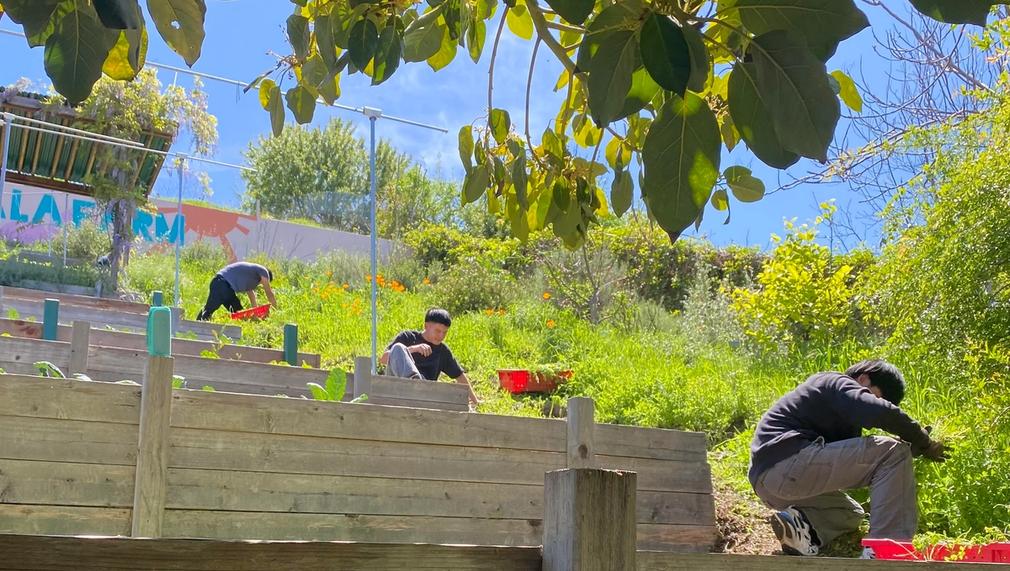Community-Centered Growing Incubator
The Avenue 33 Farm Community-Centered Growing Incubator will be a paid training program that will teach hands-on regenerative farming and supporting business skills. The incubator will provide access to land, equipment, education, technical assistance, and revenue streams. By investing in our community’s groundswell for food sovereignty through workforce development, this program will provide needed technical training for managing and expanding LA’s expanding community centered growing spaces while improving sustainable local food production.

What is the primary issue area that your application will impact?
Green space, park access, and trees
In which areas of Los Angeles will you be directly working?
East LA
In what stage of innovation is this project, program, or initiative?
Expand existing project, program, or initiative (expanding and continuing ongoing, successful work)
What is your understanding of the issue that you are seeking to address?
Avenue 33 Farm (Ave33) serves the densely populated community of Lincoln Heights, primarily a neighborhood of immigrant renters. Lincoln Heights has no community garden and limited park access while the existing outdoor spaces, such as Flat Top Park, are privately owned and under threat of development. Food insecurity and income inequality are barriers that Lincoln Heights struggles with. 70% of Ave33’s customer base are SNAP users and In 2025 we’ve had a market growth of 25%. These customers navigate the stigma of using SNAP in grocery settings in an extremely limited access to high quality produce in the neighborhood. Across LA there is a need for access to growing spaces and technical knowledge to help develop urban farmers so that community centered growing spaces can thrive. Food sovereignty is a solution for food scarcity and improving community-centered green spaces.
Lincoln Heights is a community that is in need of investment- for green space, food access, and income equity.
Describe the project, program, or initiative this grant will support to address the issue.
The cohort will grow on Ave33 for at least six months. Farmers can then lease ⅛ of the land for their own projects for up to three years and will have tech and business support from Ave33.Supporting local farmers strengthens our larger network of alternative food systems, community-centered green spaces, and our local economy. Community-centered green spaces with knowledgeable leaders will produce more successful harvests, leading to higher turnout at green spaces. This incubator will foster a cohort of experienced facilitators who will increase Ave33’s capacity for volunteer and workshop opportunities. They will bring their new knowledge into the farm space, making it a collaborative and creative education hub for outdoor workshops.This program will exist for farmers to serve the needs of their own neighborhood and communities. Speciality farm-centered workshops of varying interest levels will be open to the public for community-focused growers as well.
Ave33 will pay trainees while they learn. One terrace of year-round crops forecasts $8K a year in gross sales per student farmer. The farm will buy produce harvested from the cohort at full value and use it for Ave33’s affordable farmstand. This incubator supports Ave33’s longstanding program that curates a welcoming space prioritizing SNAP customers.
Describe how Los Angeles County will be different if your work is successful.
In one year an incubator program provides a legitimate path towards food sovereignty that generates income, provides resources for the neighborhood to grow food, and feeds the community. In the following three years as farmers work towards their next community-centered green space they may use their relationship with Ave33, an established business of eight years with multiple revenue sources, as a creditable referral and resource. These local farmers will maximize existing community-centered green space by effectively growing food to provide directly to the community, thus educating the public in the process. Community-centered green spaces are not only successful for addressing income and health inequality through affordable food access,it also provides a hands-on approach to skill-sharing and community building.
Approximately how many people will be impacted by this project, program, or initiative?
Direct Impact: 1,187
Indirect Impact: 3,532